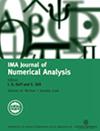变指数弱奇异Volterra积分方程的一般配位分析
IF 2.3
2区 数学
Q1 MATHEMATICS, APPLIED
引用次数: 0
摘要
第二类弱奇异Volterra积分方程(VIEs)的分段多项式配置问题在文献中得到了广泛的研究,其中考虑了$(t-s)^{-\alpha}$形式的积分核对于某常数$\alpha \in(0,1)$。变阶分数阶微分方程是目前研究的热点。Wang(2020),均匀或梯度网格上变阶空间分数扩散方程的最优阶数值逼近。SIAM J. number。分析的, 58, 330-352),将该问题转化为弱奇异VIE,其核具有上述形式,变量$\alpha = \alpha (t)$,然后通过分段线性配置进行数值求解,但尚不清楚这种分析是否可以推广到更一般的问题或更高次的多项式。本文利用新技术,建立了变指数弱奇异vie的一般理论(解的存在性、唯一性和正则性)。然后,这些结果支持可以使用任意程度的分段多项式的搭配方法的误差分析。这种误差分析也是新颖的,它没有使用通常的解析表示,这是当前研究文献中vie搭配方法误差分析的关键技术。此外,上述对标量VIE的分析可以推广到某些非线性VIE和VIE系统。数值算例表明,所得到的配置方法的理论误差界限是清晰的。本文章由计算机程序翻译,如有差异,请以英文原文为准。
A general collocation analysis for weakly singular Volterra integral equations with variable exponent
Abstract Piecewise polynomial collocation of weakly singular Volterra integral equations (VIEs) of the second kind has been extensively studied in the literature, where integral kernels of the form $(t-s)^{-\alpha }$ for some constant $\alpha \in (0,1)$ are considered. Variable-order fractional-derivative differential equations currently attract much research interest, and in Zheng & Wang (2020, An optimal-order numerical approximation to variable-order space-fractional diffusion equations on uniform or graded meshes. SIAM J. Numer. Anal., 58, 330–352), such a problem is transformed to a weakly singular VIE whose kernel has the above form with variable $\alpha = \alpha (t)$, then solved numerically by piecewise linear collocation, but it is unclear whether this analysis could be extended to more general problems or to polynomials of higher degree. In the present paper, the general theory (existence, uniqueness, regularity of solutions) of variable-exponent weakly singular VIEs is developed using novel techniques. These results then underpin an error analysis of collocation methods where piecewise polynomials of any degree can be used. This error analysis is also novel—it makes no use of the usual resolvent representation, which is a key technique in the error analysis of collocation methods for VIEs in the current research literature. Furthermore, all the above analysis for a scalar VIE can be extended to certain nonlinear VIEs and to systems of VIEs. The sharpness of the theoretical error bounds obtained for the collocation methods is demonstrated by numerical examples.
求助全文
通过发布文献求助,成功后即可免费获取论文全文。
去求助
来源期刊
CiteScore
5.30
自引率
4.80%
发文量
79
审稿时长
6-12 weeks
期刊介绍:
The IMA Journal of Numerical Analysis (IMAJNA) publishes original contributions to all fields of numerical analysis; articles will be accepted which treat the theory, development or use of practical algorithms and interactions between these aspects. Occasional survey articles are also published.

 求助内容:
求助内容: 应助结果提醒方式:
应助结果提醒方式:


